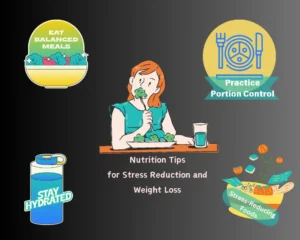How to Reduce Stress to Lose Weight: 5 Lifestyle Changes

In today’s fast-paced world, where stress seems to be an unavoidable part of daily life, learning how to reduce stress to lose weight is crucial. Stress and weight gain are linked. Chronic stress can upset hormones, causing cravings, overeating, and trouble losing weight. So, managing stress is key for weight loss.
This comprehensive guide explores how stress affects weight gain and provides practical tips and techniques for reducing stress and helping you on your weight loss journey.
How Stress Affects Weight Gain
The “stress hormone,” cortisol, is commonly referred to as how the body reacts to stress. When faced with a stressful situation, the adrenal glands release cortisol into the bloodstream to help the body cope with danger. Although cortisol plays an important role in the acute stress response, persistently elevated cortisol levels can cause health problems, including weight gain.
This study delves into the several mechanisms through which stress can lead to weight gain, including hormonal changes and behavioral responses, and discusses the implications for preventing and treating obesity.
Prolonged stress can interfere with the functioning of appetite, increasing hunger and comfort food cravings high in calories. Stress-induced eating often involves the consumption of sugary, fatty foods, which can contribute to weight gain over time. Emotional eating, driven by stress, is a common response to negative emotions such as anxiety, sadness, or boredom.
What Does Stress Weight Look Like?
Stress weight gain often manifests as an increase in abdominal fat. This is due to the body’s tendency to store fat around the midsection when cortisol levels are elevated. The accumulation of visceral fat in this area can lead to a noticeable change in body shape. The signs of your weight gain connected to stress are:
- If you notice weight gain primarily around your midsection, it might be due to elevated cortisol levels.
- An ongoing desire for items heavy in fat, sugar, or calories indicates that stress affects your eating patterns.
- Stress might be the culprit if you’re gaining weight despite maintaining a healthy diet and regular exercise.
- Stress influences your eating habits when you turn to food in times of anxiety, sadness, or boredom.
- Poor sleep or insomnia can be related to stress, and inadequate rest can contribute to weight gain.
- Chronic stress can lead to fatigue, reduce physical activity, and cause weight gain.
- A significant increase in appetite, especially during stressful times, may indicate that stress affects your weight.
- If you find it particularly hard to shed pounds even with a balanced diet and exercise, stress might be a contributing factor.
Stress Makes Weight Gain Even If You Don’t Eat
Stress can lead to weight gain even without increased food intake. Chronic stress slows the metabolism and promotes fat storage, particularly around the abdomen. Additionally, stress can reduce physical activity levels and disrupt sleep patterns contributing to weight gain.
Stress-related weight gain typically affects the abdominal area. The body stores more fat around the midsection in response to elevated cortisol levels, leading to visceral fat. This type of fat is particularly concerning as it surrounds vital organs and is linked to various health risks.
How to Reduce Stress to Lose Weight
Stress can significantly impact your ability to lose weight by affecting your hormones, eating habits, and overall energy levels. By managing stress through intentional lifestyle changes, you can feel better and achieve your weight loss goals more effectively. Here are some key strategies for reducing stress and promoting weight loss:
Prioritize Sleep and Relaxation
Adequate sleep is the foundation of stress management and a healthy weight. When you don’t get enough sleep, your body produces high cortisol levels, a stress hormone that can increase hunger and cravings for unhealthy foods. Lack of sleep also disrupts hormones that control hunger, such as ghrelin and leptin, which can cause you to overeat.
Tips for improving sleep and rest:
- Aim for 7-9 hours of uninterrupted sleep each night.
- Create a consistent bedtime and wake-up schedule, even on weekends.
- Establish a relaxing bedtime routine by avoiding screens, drinking herbal tea, or practicing deep breathing before bed.
- Make your bedroom a conducive environment for sleep by keeping it cool, dark, and quiet.
Incorporate Stress-Reducing Activities
Finding ways to relax your mind and body is essential for managing stress. Stress-reducing activities can help lower cortisol levels, improve mood, and promote better decision-making around food and exercise.
Ideas for stress-relief activities:
- Yoga: Combines physical movement with deep breathing, reducing stress while improving flexibility and strength.
- Meditation: Helps calm your mind, focus on the present moment, and manage overwhelming thoughts.
- Deep breathing exercises: A quick way to reduce stress by slowing your heart rate and promoting relaxation.
- Tai chi: This gentle form of martial arts improves mental clarity and reduces anxiety.
- Nature walks: Spending time outdoors can boost mood, reduce stress, and provide a natural dose of vitamin D.
- Music therapy: Calming or uplifting music can instantly reduce stress levels.
Practice Mindful Eating
Mindful eating is about giving your full attention to eating, which helps you make healthier choices and better control your portions. By paying attention to your body’s hunger and fullness cues, you can avoid overeating due to emotions or stress.
Steps to practicing mindful eating:
- Eat without distractions like the TV or your phone.
- Take small bites and chew well to savor every flavor and texture.
- Notice the taste, smell, and feel of your food.
- Ask yourself if you’re eating because of hunger or emotion, and stop eating when you feel satisfied, not full.
- Mindful eating not only helps you lose weight, but it also helps you develop a healthy relationship with food.
Regular Physical Activity
Exercise is a powerful stress reliever and can help manage weight by burning calories and improving metabolism. Exercise reduces levels of stress hormones such as cortisol and increases the production of endorphins, chemicals that improve mood and create a sense of well-being.
Exercise recommendations for stress and weight loss:
- Aim for 150 minutes of moderate aerobic exercise (brisk walking or cycling) or 75 minutes of vigorous-intensity exercise (running or HIIT) each week.
- Choose activities you enjoy, whether walking, jogging, cycling, swimming, or dancing.
- Include strength training twice a week to build muscle and boost metabolism.
- Even small activities, like a 10-minute walk during your lunch break, can make a big difference in managing stress and maintaining a healthy weight.
Establish Healthy Habits
- Create a routine of regular meals, snacks, and physical activity to promote stability and reduce stress.
- Avoid skipping meals or relying on convenience foods, because it can disrupt blood sugar levels and increase stress.
- Plan and prepare nutritious meals and snacks to support your weight loss goals.
Consistency is key when reducing stress and losing weight. A well-planned routine can structure your day, reduce decision fatigue, and prevent unhealthy coping mechanisms.
Steps to creating healthy habits:
- Plan your meals: Prepare balanced, nutritious meals to avoid reaching for high-calorie, convenience foods.
- Stick to a schedule: Eat intermittently to stabilize blood sugar levels and reduce cravings.
- Stay hydrated: Dehydration can mimic hunger and increase stress, so drink plenty of water throughout the day.
- Limit caffeine and alcohol: These can worsen stress and disrupt your sleep.
By creating a routine that includes regular meals, snacks, and physical activity, you’ll feel more in control and be less likely to fall into unhealthy patterns.
Explore the Best Low-carb Snacks for Weight Loss.
Nutrition Tips for Stress Reduction and Weight Loss

Eat a Balanced Diet
- Focus on whole, nutrient-dense foods such as fruits, vegetables, lean proteins, whole grains, and healthy fats.
- Get a variety of vitamins and minerals by including a range of colors and flavors in your meals.
- Restrict your intake of processed foods, sugary snacks, and beverages with added sugars as these may contribute to stress and lead to weight gain.
Include Stress-Reducing Foods
Certain foods contain nutrients that can help reduce stress and promote relaxation.
Here are some foods to include:
- Leafy Greens: Spinach, kale, and Swiss chard are high in magnesium, which helps relax muscles and calm the nervous system.
- Nuts and Seeds: Almonds, walnuts, flaxseeds, and chia seeds provide essential fatty acids and magnesium that help reduce stress.
- Fatty Fish: Salmon, mackerel, and sardines are rich in omega-3 fatty acids, which reduce inflammation and lower stress levels.
- Whole Grains: Quinoa, brown rice, and oats are high in fiber and help stabilize blood sugar levels, reducing stress and cravings.
- Berries: Blueberries, strawberries, and raspberries are filled with antioxidants that help combat stress and support overall health.
- Yogurt has a high probiotic content that maintains a healthy gut, reducing stress levels and improving mood control.
- Avocado: Provides healthy fats and potassium, which can help lower blood pressure and reduce stress.
Stay Hydrated
Dehydration can exacerbate stress and fatigue, so staying hydrated is essential throughout the day. Aim to drink plenty of water and limit caffeinated beverages, which can increase cortisol levels and contribute to stress.
Practice Portion Control and Self-Care
- Pay attention to portion sizes and avoid overeating, even when consuming healthy foods.
- Use smaller plates and bowls to help control portion sizes and prevent mindless eating.
- Be careful of serving sizes when eating out or indulging in treats, and practice moderation.
- Make self-care a priority by incorporating activities that promote relaxation and rejuvenation into your daily routine.
- Take time each day to do something you enjoy, whether reading, bathing, or practicing a hobby.
- Practice self-compassion and avoid being too hard on yourself, especially during stress or setbacks.
Seek Support
Seek emotional support and encouragement from friends, family, or a support group. Talking to someone you trust about your feelings can help alleviate stress and provide perspective. Consider seeking professional help from a therapist or counselor if stress affects your daily life.
Avoid these Foods
Limiting or avoiding certain foods is important to support a healthy lifestyle and reduce stress. Below is a detailed list of foods that fall into these categories:
- Sugary Snacks: Candy, pastries
- Sugary Beverages: Soda
- Processed Foods: Fast food, packaged snacks (e.g., crackers, cookies)
- Fried Foods: Fried chicken, chips
- High-Sodium Foods: Processed meats (e.g., hot dogs, sausages), canned soups with high-sodium
- Alcohol: Alcoholic beverages
By avoiding or limiting these foods, you can better manage your weight and reduce stress, contributing to overall health and well-being.
Monitoring Progress and Modifying Plans
Monitor Stress Levels
- Please keep track of your stress levels and how they impact your eating habits, mood, and overall well-being.
- Use a journal or mobile app to record your daily stressors, emotions, and coping strategies.
- Pay attention to patterns and triggers, and identify strategies most effectively reducing stress.
Make Adjustments as Needed
- Be flexible and willing to adjust your stress management strategies based on your needs and experiences.
- Experiment with different techniques to find what works best for you, whether meditation, exercise, or spending time with loved ones.
- Seek support from a healthcare professional or therapist if you’re struggling to manage stress independently.
Conclusion
Reducing stress is essential for achieving and maintaining a healthy weight. You can design a better, more balanced lifestyle by putting self-care first and implementing practical stress management techniques into your everyday routine. Prioritize sleep, relaxation, mindful eating, regular exercise, and emotional well-being to enhance your overall health and well-being.
Remember to be patient with yourself and seek support when needed as you embark on your journey to reduce stress and achieve your weight loss goals.
FAQs
- Can stress cause weight gain even if I eat healthy?
Yes, chronic stress can lead to weight gain regardless of dietary habits. Elevated cortisol levels can promote fat storage, particularly around the abdominal area. - How can I tell if the reason I’m eating is stress or true hunger?
Pay attention to your body’s hunger cues. True hunger is often accompanied by physical sensations such as stomach growling or lightheadedness, while emotional eating tends to be triggered by specific emotions or situations. - What are some quick stress-relief techniques I can use?
Deep breathing exercises, progressive muscle relaxation, and visualization techniques can provide quick relief from stress and help promote relaxation.
Taking short breaks throughout the day to stretch, walk, or engage in a calming activity can also help alleviate stress. - Is it possible to lose weight without reducing stress levels?
While weight loss is possible without addressing stress directly, managing stress can greatly enhance the effectiveness of weight loss efforts and promote overall well-being. By reducing stress, individuals may find it easier to adhere to healthy lifestyle changes and maintain long-term weight loss success. - How long does it take to see results from stress-reducing strategies?
The timeline for seeing results can vary depending on individual factors such as the severity of stress, adherence to stress-reducing techniques, and overall lifestyle habits. Some people may experience immediate relief from stress, while others may require more time and consistency to notice significant improvements.






